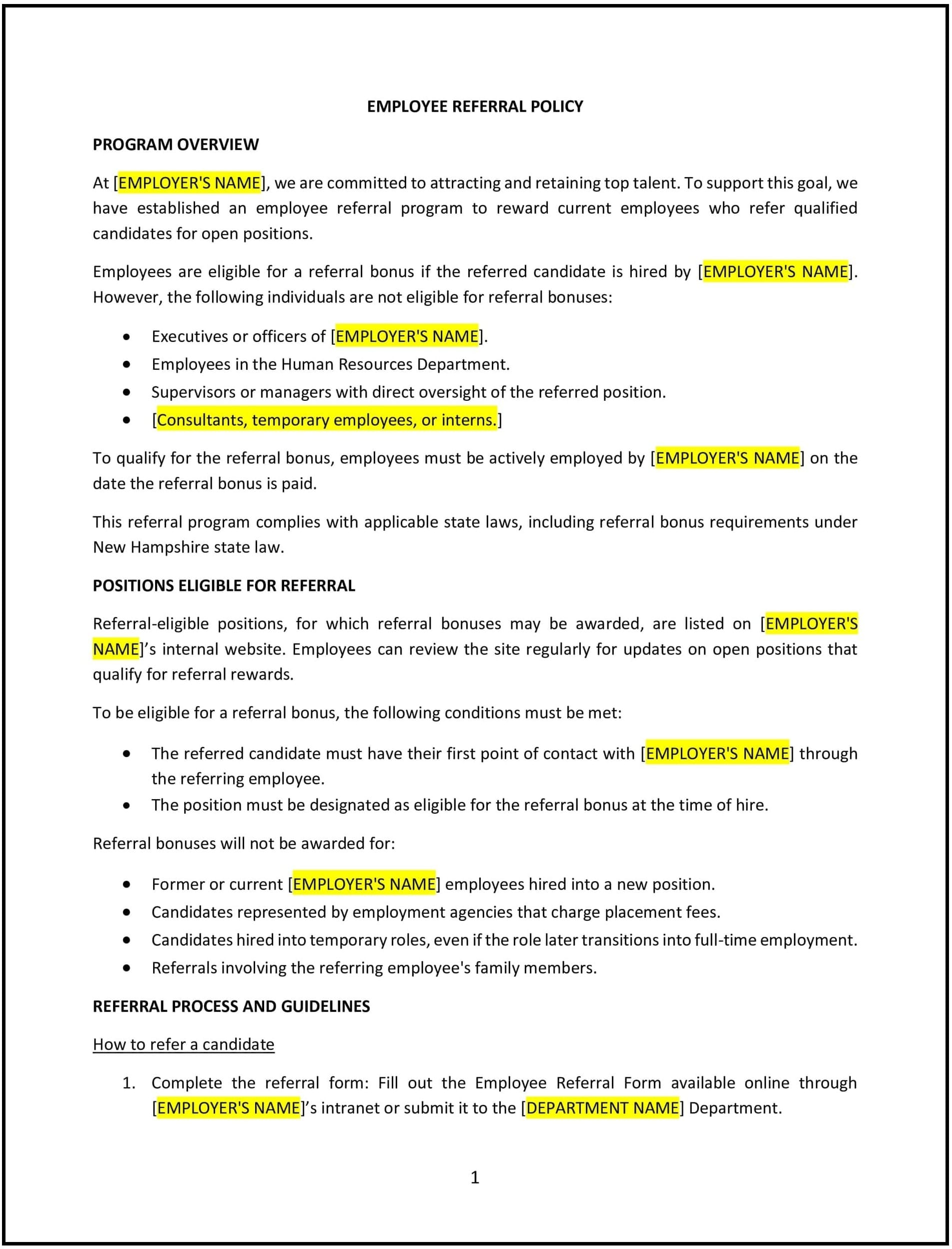Employee referral plan (New Hampshire): Free template
Got contracts to review? While you're here for policies, let Cobrief make contract review effortless—start your free review now.

Customize this template for free
Employee referral plan (New Hampshire)
An employee referral plan helps New Hampshire businesses tap into their existing workforce to identify and recruit top talent. This policy outlines the guidelines for encouraging employees to refer qualified candidates for open positions within the company, offering incentives and recognizing successful referrals.
By implementing this plan, businesses in New Hampshire can leverage the networks of current employees, streamline the recruitment process, and increase employee engagement through rewards and recognition.
How to use this employee referral plan (New Hampshire)
- Define eligibility: Specify which employees are eligible to participate in the referral program, such as full-time, part-time, or temporary employees.
- Outline referral process: Detail how employees should submit referrals, including the format (e.g., email, referral portal) and the information required (e.g., resume, cover letter, contact details).
- Establish referral rewards: Clarify the incentives or rewards employees will receive for successful referrals, such as bonuses, gift cards, extra PTO, or other forms of recognition.
- Set criteria for successful referrals: Define what qualifies as a successful referral, including whether the referred candidate must be hired and complete a probationary period or meet performance goals.
- Provide clear timelines: Outline the timeline for referrals, including how soon employees must submit a referral after learning about a job opening and how long the referral incentive will remain valid.
- Ensure confidentiality: Ensure that employee referrals are kept confidential, especially when the referral process involves personal information about the candidate.
- Communicate the program: Regularly remind employees about the referral program and any updates to the process or rewards.
- Monitor and evaluate: Track the effectiveness of the program by reviewing referral data, measuring the success rate of referred candidates, and adjusting incentives or processes as necessary.
Benefits of using this employee referral plan (New Hampshire)
This plan provides several benefits for New Hampshire businesses:
- Reduces recruitment costs: By leveraging existing employees to find candidates, businesses can reduce costs associated with external recruitment agencies and advertising.
- Improves hiring quality: Employees are more likely to refer candidates who are a good fit for the company culture and the role, increasing the chances of a successful hire.
- Increases employee engagement: Employee referral programs incentivize employees to actively participate in the hiring process, fostering a sense of ownership and engagement in company growth.
- Speeds up hiring: Referrals often result in faster hiring times, as the candidates come pre-vetted through the employee’s recommendation.
- Strengthens company culture: By hiring candidates who are recommended by existing employees, businesses can reinforce and strengthen their organizational culture.
Tips for using this employee referral plan (New Hampshire)
- Communicate the program clearly: Ensure that employees fully understand the referral process, the types of roles eligible for referral, and how to submit referrals.
- Offer attractive rewards: To motivate employees to participate, ensure that the rewards for successful referrals are appealing and meaningful to your workforce.
- Recognize top referrers: Publicly acknowledge employees who refer multiple successful candidates or who consistently contribute to the recruitment process.
- Maintain transparency: Keep employees updated on the status of their referrals and any changes to the program, including how long it takes to process referrals and how rewards are distributed.
- Track program success: Regularly evaluate the effectiveness of the program by measuring referral success rates, time-to-hire, and employee feedback to refine the process.